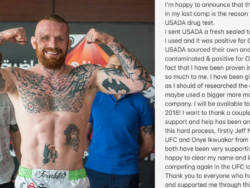The trouble with Ostarine: Jimmy Wallhead’s
16th March 2018
Features


• UNESCO has put forward recommendations for the strengthening of its International Convention Against Doping in Sport as a result of the various investigations into systemic doping in Russia. ‘The Bureau will submit to the 6th session of the Conference of Parties a set of measures that will strive for better international cooperation to enable transparency and harmonisation of national anti-doping public policies’, read a UNESCO statement. It will also put forward recommendations for: a review of Russian anti-doping policy; an ability to monitor the compliance with national anti-doping policy; a Review Commission of State Policy and Anti-Doping; and an Ad Hoc Task Force to address all matters related to doping.
• The International Association of Athletics Federations (IAAF) has published an updated list of athletes sanctioned for a doping offence as of 25 July. The list includes Chinese race-walker Liu Hong, the world record holder in the 20km race walk. Hong tested positive for ‘fat burner’ higenamine on 7 May, however she was only given a one-month ban from 13 June to 13 July, as it is understood that the IAAF accepted her explanation that the substance was in a medication she had taken for tonsillitis. The list also includes 62-year old Greg Pizza, who was sanctioned with a 20-month ban for taking an erectile dysfunction pill and runner Farhod Kuralov of Tajikistan, who was sanctioned with a four-year ban after failing an out-of-competition test on 13 June.
• The Court of Arbitration for Sport (CAS) has dismissed an appeal of the Russian Weightlifting Federation (RWF) against its suspension by the International Weightlifting Federation (IWF). The CAS also dismissed an appeal by 17 Russian rowers against a World Rowing (FISA) decision to ban them from the Rio 2016 Olympics. An update on the 18 cases registered with the CAS ad-hoc division is available by clicking here.
• Russian President Vladimir Putin has said that Russia will not accept the exclusion of its clean athletes from the Rio 2016 Olympics. ‘A targeted campaign, the aim of which involves our athletes, and includes the notorious so-called “double standards”, and is not compatible with sport – and indeed with justice and elementary rules of law – the principle of collective responsibility, or, as has been said, “the abolition of the presumption of innocence”’, he said in a speech. ‘Unfairly affected are not only many of our athletes, against which was never put forward any specific – I want to emphasise – no concrete evidence […] We can not accept the indiscriminate disqualification of our athletes with absolutely – I want to stress this – it is an absolutely clean doping history. We can not tolerate and will not put up with what is known to be, and is in fact, blatant discrimination. This fully corresponds to the principles of Olympism. However, we will seek the truth only in a lawful manner, and will act in strict accordance with the Olympic Charter.’
• Zambia have been disqualified from the 2016 COSAFA Under-17 Championships being staged in Mauritius, having been found to have fielded two over-age players for the tournament. The Confederation of African Football (CAF) said that Magnetic Resonance Imaging (MRI) tests carried out on Nicholas Mulilo and Benjamin Phiri showed that both were over the age of 17. Both players had been tested prior to the tournament, however a statement said that these tests were incorrect done. ‘MRI scans have become standard in assessing the age of players in this age-group with a 99 percent accuracy’, read the statement. ‘Every bone in the arm and leg has an end plate from which bones grow. When the growth is completed (usually around the age of 17), then this end plate disappears on the MRI scans. If it can be seen on the MRI scans, then it is proof that the player is 17 or younger.’
David Howman, former Director General of the World Anti-Doping Agency (WADA), has cast doubt on...
• The South African Institute for Drug-Free Sport (SAIDS) has condemned Fancy Bears’ publication of a...
A further publication of data illegally obtained from the World Anti-Doping Agency’s (WADA) Anti-Doping Administration...